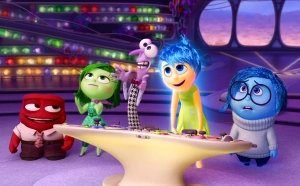There really isn’t much that I can say positive or not-so-positve about Pixar’s Inside Out (2015) that hasn’t already been said in The Atlantic, Forbes, The Huffington Post, and in countless other places. This wildly popular film has received overwhelming praise across the board because its complexity makes it much more than a children’s movie (or in ways much more than any typical movie).
While I agree it might be a bit overrated, especially for folks already well versed in psychology and theory, the film is intriguing and important and focuses of female characters the vasty majority of the time (it totally passes the Bechdel test!). Inside Out occurs almost exclusively in the brain of Riley. In her brain, Joy, Sadness, Disgust, Fear, and Anger go to work trying to protect Riley in their own ways.
Inside Out emphasizes the subjective complexity of the mind, endless storage available in the mind, constantly changing and evolving and even conflicting emotions that exist at the same time, and how we don’t really know that much about the brain, and that it is at work 24/7 from our first breath to our last in conjunction with a host of other forces and has the ability to self-heal.
At the same time, Inside Out acknowledges we don’t have room or energy to hold on to everything forever – that we need a vacuum for the mind.
Inside Out makes having many “personalities” normal (“islands of personality”).
It further encourages people to try to understand what others are thinking and to realize they too have a very different Joy, Sadness, Disgust, Fear, and Anger living “in” their brain and that we can never fully understand the actions and thoughts of others.
Joy, Sadness, Disgust, Fear, and Anger–naturally–do not represent the full range of human emotions but they serve as good markers for the big ones, and Inside Out does not make one emotion better or worse than another one. I would for sure recommend this film for people of all ages. And for my academic friends, the film has an awesome deconstruction scene and subtly criticizes “participation awards.”
